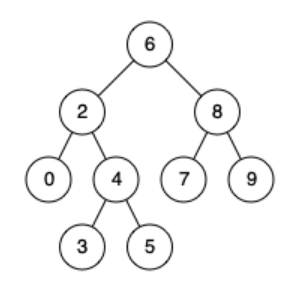Lowest Common Ancestor of a Binary Search Tree
Tree
easy
Score: 0
Given a binary search tree (BST), find the lowest common ancestor (LCA) of two given nodes in the BST.
According to the definition of LCA on Wikipedia: “The lowest common ancestor is defined between two nodes p and q as the lowest node in T that has both p and q as descendants (where we allow a node to be a descendant of itself).”
Class TreeNode:
val (int)
left (TreeNode)
right (TreeNode)
Input Format:
First Parameter - root of the tree.
Second Parameter - value of the first node p.
Third Parameter - value of the second node q.
Output Format:
Return the lowest common ancestor of the two nodes.
Example 1:
Input:
root = [6 2 8 0 4 7 9 null null 3 5]
p = 2
q = 8
Output:
6
Explanation:
The LCA of nodes 2 and 8 is 6.
Example 2:
Input:
root = [6 2 8 0 4 7 9 null null 3 5]
p = 2
q = 4
Output:
2
Explanation:
The LCA of nodes 2 and 4 is 2, since a node can be a descendant of itself according to the LCA definition.
Example 3:
Input:
root = [2 1]
p = 2
q = 1
Output:
2
Constraints:
- The number of the nodes is in the range [2,105].
- -109 <= node.val <= 109.
- All node.val are unique.
- p!=q.
- p and q will exist in the BST.
- Expected Time Complexity: O(h), where h is the height of the BST.
- Expected Space Complexity: O(1).
